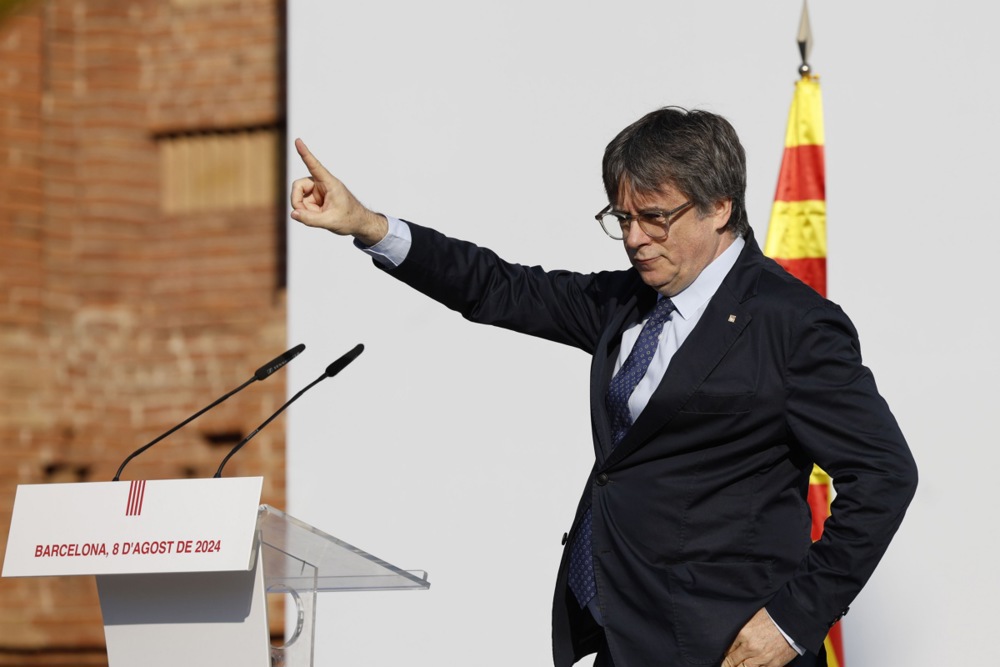Catalan separatist Carles Puigdemont has petitioned Spain’s Constitutional Court to suspend his outstanding arrest warrant.
That would allow the former MEP, who led a 2017 referendum on Catalan independence deemed illegal by the Spanish Government, to return to Spain without fear of ending up in prison.
Despite an amnesty law for Catalan separatists passed in 2021, Puigdemont is still facing charges in Spain’s Supreme Court of mishandling of public funds.
On October 7, Puigdemont filed a plea for protection from the Supreme Court in the Constitutional Court. He is still awaiting a decision.
Today, Puigdemont’s lawyer Gonzalo Boye asked the Constitutional Court for “the immediate suspension of the search, arrest and imprisonment orders” for the Catalan separatist, while it studies his request for protection from the Supreme Court.
His defence leaned on recent conclusions from the Advocate General of the Court of Justice of the European Union regarding the Spanish amnesty law.
Spain has two high courts, the Constitutional Court and the Supreme Court. The former, which some consider stacked by Prime Minister Pedro Sánchez, ruled in favour of the amnesty law’s constitutionality in 2023.
Nevertheless, the Supreme Court has ruled that the charges against Puigdemont of mishandling public funds were not pardonable under the amnesty law.
Opponents of the amnesty law have also challenged it in the EU courts and on November 13, Dean Spielmann, the Advocate General of the Court of Justice of the European Union, delivered an initial opinion generally approving the amnesty, although he also noted that it violates several points of EU procedural law.
That opinion is preliminary and non-binding. A final ruling from the judges is expected in the coming months.
In the text filed in court today, Puigdemont based this second plea on the fact that both the Constitutional Court and Spielmann have evaluated the amnesty favourably.
The letter presented by Puigdemont’s defence terms Spielmann an “indisputable interpretative authority”.
“This pronouncement, together with the declaration of constitutionality of the amnesty, eliminates any legal basis to keep an arrest warrant alive while the protection plea is being processed,” Boye states.
He further argues the amnesty covers “all actions” related to promoting Catalan independence and must be “fully effective and applicable” during the appeal process to “avoid irreparable damage” to Puigdemont.
“There is no reasonable legal doubt,” Boye states, “that justifies the persistence of arrest warrants in a scenario in which both national and European law endorse the immediate effectiveness of the amnesty.”
Puigdemont remains the head of Junts, a separatist party with seven seats in Spain’s congress of deputies.
Although small, the party has outsized influence on Spanish politics as its votes are decisive in the tightly divided parliament.
Junts decided to support Sánchez, allowing him to retain control of the government after his party came in second in the last elections.
The new government then quickly passed a law that granted a wide amnesty to Catalan separatists, theoretically including Puigdemont.
In late October, Puigdemont and his party publicly withdrew their support of Sánchez, supposedly leaving the PM impossibly weakened in parliament.
Nevertheless, political observers in Spain note that the party quietly allowed a win for Sánchez in parliament by abstaining on an important vote regarding the shutdown of nuclear power plants.
Others have pointed out that Puigdemont wants to return to Spain with a public triumph, a question that is now in the hands of a court many believe to be controlled by Sánchez.





